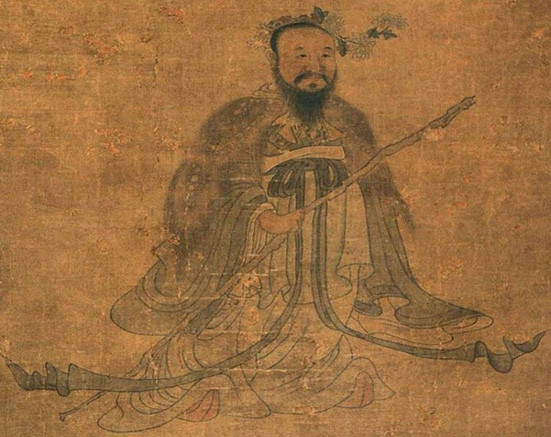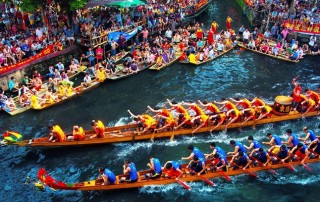The Chinese Dragon Boat Festival (端午节 - Duānwǔ jié) is one of the oldest holidays in China. It is celebrated on the 5th day of the 5th lunar month of the Chinese calendar. Duanwu Festival’s highlight is marked by boats designed to look like dragons which race on the provinces’ important rivers. But as always in China, there is more to this festival than just dragons and boat races, it is an authentic celebration with a lot of tradition and customs!
The Legend behind the tradition
 The holiday’s legend revolves around Qu, a minister of the State of Chu which is now the Hunan and Hubei provinces. He was a good Minister, loyal and honest. One day, a corrupt prince denigrated Qu, an action which disgraced and dismissed him from office. Seeing that the state of Chu had fallen into the hands of evil rulers, Qu committed suicide by leaping into the Miluo River. Nearby fishermen tried to save him but were unable to recover his body.
The holiday’s legend revolves around Qu, a minister of the State of Chu which is now the Hunan and Hubei provinces. He was a good Minister, loyal and honest. One day, a corrupt prince denigrated Qu, an action which disgraced and dismissed him from office. Seeing that the state of Chu had fallen into the hands of evil rulers, Qu committed suicide by leaping into the Miluo River. Nearby fishermen tried to save him but were unable to recover his body.
Sometime after, the people of Chu who mourned the death of Qu threw rice into the river to feed his ghost. But one year, the spirit of Qu appeared and told the mourners that a huge reptile in the river had stolen the rice. The spirit recommended them to wrap the rice in silk and bind it with five different-colored threads, before throwing it.
The dragons race on
 A dragon boat is usually from 50-100 feet in length, with a beam of about 5.5 feet, accommodating two paddlers seated side by side. Competing teams drive their boats forward rowing to the rhythm of pounding drums. Men at the bow set off firecrackers, throw rice into the water and pretend to be looking for Qu. The races are held among different clans, villages and organizations. The winners are awarded medals, banners, jugs of wine and festive meals. But still, this race is still more about tradition than winning!
A dragon boat is usually from 50-100 feet in length, with a beam of about 5.5 feet, accommodating two paddlers seated side by side. Competing teams drive their boats forward rowing to the rhythm of pounding drums. Men at the bow set off firecrackers, throw rice into the water and pretend to be looking for Qu. The races are held among different clans, villages and organizations. The winners are awarded medals, banners, jugs of wine and festive meals. But still, this race is still more about tradition than winning!
Symbols and Customs
A long time has passed since the legend began. However, the festival still honors the memory of its story. The dragon-boat races symbolize the many attempts to rescue and recover Qu's body. Also, a glutinous rice wrapped in leaves called zòngzi ( 粽子) is eaten to symbolize the rice offerings to Qu.
But the festival is also a tradition to ask for protection against evil and disease for the rest of the year. Occurring at the beginning of summer when there are a lot of insects, the festival reminded family members to take care of their health. The Chinese hang the traditional calamus and moxa herbs and drink hsiung huang wine, but also use more advanced methods for protecting their health.
By the way, on the day of the festival, if you can stand an egg on its end at exactly 12:00 p.m., the following year will be a lucky one!
José de la Luz Sáenz Garza
Marketing Assistant Intern